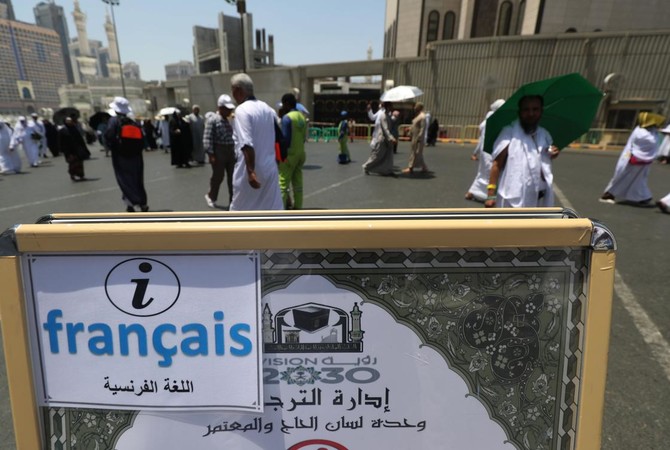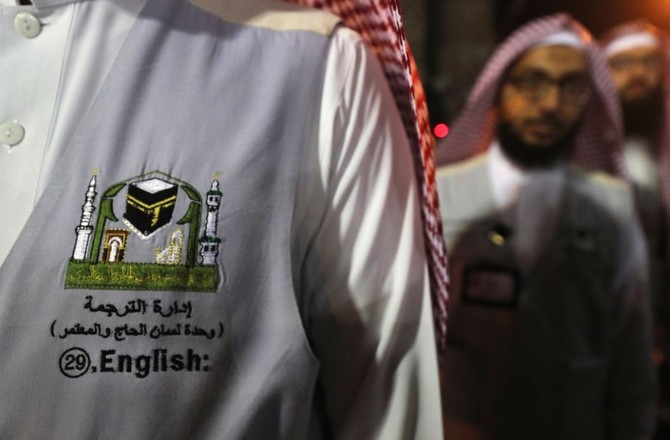MAKKAH, Saudi Arabia: Lost in translation? Not in Makkah, thanks to a dedicated squad of interpreters gearing up to help two million Muslims speaking dozens of languages at the annual Hajj pilgrimage.
The six-day Hajj, which starts on Sunday, is one of the five pillars of Islam, an act all Muslims must perform at least once if they have the means to travel to Saudi Arabia.
Most of the world’s Muslims do not speak Arabic — Indonesia is home to the largest Muslim community by population, while tens of millions of the faithful are native speakers of Urdu.
In all, 80 percent of pilgrims to the western Saudi city of Makkah are non-Arabic speakers, according to Mazen Al-Saadi of the official Hajj translation bureau.
His team provides 24/7 interpretation services in English, French, Farsi, Malay, Hausa, Turkish, Chinese and Urdu — the most widely spoken language among Hajj pilgrims.
For Samir Varatchia, who made the trip to Makkah from France’s Indian Ocean island of Reunion, the men in grey vests — the uniform of the official Hajj translation team — are a welcome sight.
“I really don’t know much Arabic,” Varatchia told AFP.
“The French translation will help us understand things, including the sermons.”
Tunisian interpreter Abdulmumen Al-Saket is happy to help, fielding frequent requests for his phone number.
“We try to help as much as we can, even with reading the maps,” he said.
“Some ask for our personal phone numbers, to call us later if they need help,” he added.
Pilgrims come to Makkah from across the world, including India, Pakistan, Nepal and Bangladesh. Many speak only Urdu, Saadi said.
Many of the signs directing pilgrims are translated into English, Urdu and in some cases, French.
Makkah’s Grand Mosque provides a range of translation and interpreting services to pilgrims.
Specialist departments deal with sermons and rulings, and a hotline is available in dozens of languages to answer religious questions.
But for practical matters, Saadi’s 80-strong team is indispensible.
The department has been in place for four years, he said, and is being continuously expanded to deal with rising demand.
“Most (pilgrims) don’t speak Arabic and are afraid to ask in the event of an accident,” Sanaullah Ghuri, an Indian translator, told AFP in Arabic.
A deadly stampede in 2015 left more than 2,000 pilgrims dead in Mina, the Makkah neighborhood where the symbolic stoning of the devil ritual takes place during Hajj.
Many pilgrims were unable to understand security forces’ instructions, delivered in Arabic.
The Hajj presents Saudi authorities with vast logistical challenges.
Islam is currently the world’s fastest-growing religion, according to the Pew Research Center, which says the number of Muslims in the world is expected to rise from 1.8 billion in 2015 to three billion in 2060.
The Hajj sees millions of pilgrims visit the country, all clad in white, to perform rituals in Makkah’s Grand Mosque and on the Mount Arafat plain east of Makkah.
It ends with Eid Al-Adha, a three-day feast which starts with the “stoning of the devil.”
Saudi Arabia, one of the world’s most restrictive countries, has recently embarked on an ambitious reform program spearheaded by the powerful young Crown Prince Mohammed bin Salman.
That has included pumping millions of dollars into high-tech initiatives.
Providing services for two million pilgrims is no small feat, and authorities are pushing a “smart Hajj” initiative this year to meet the rising demand.
That includes apps providing information on emergency medical services and geographic guides to Makkah and Mina, the two cities home to Islam’s holiest sites.
One app will also translate Hajj sermons into five languages.
But the Indian translator, Ghuri, said the presence of real-life interpreters made the experience of Hajj easier for pilgrims.
“When they see someone speaking their language, they feel more comfortable seeking help,” he said.
Lost in translation? Not for Muslim Hajj pilgrims
Lost in translation? Not for Muslim Hajj pilgrims

- In all, 80 percent of pilgrims to the western Saudi city of Makkah are non-Arabic speakers
- Many of the signs directing pilgrims are translated into English, Urdu and in some cases, French
Aloula partners with Saudi Music Hub to amplify young voices

- 2-month vocal program places children in spotlight
- Program culminates in performance of Saudi national anthem
JEDDAH: A new choral initiative launched by Aloula, in partnership with the Saudi Music Hub, has brought youngsters aged 9-18 into a structured vocal training program that will culminate in a performance of the Saudi national anthem.
The two-month initiative, which was launched in November, is one of the first children’s choral programs led by a nonprofit organization in Saudi Arabia.
In the rehearsal room, 75 children are learning how to sing the Saudi national anthem “Aash Al-Maleek,” and “Watani Al Habib” in a full choral arrangement.

Participants attend vocal training sessions three times a week, from Monday to Wednesday, focusing on technique, listening skills, and ensemble performance.
Speaking to Arab News, Abir Abusulayman, the CEO of Aloula, said the project was designed to include children more directly in the Kingdom’s cultural transformation.
She said: “The Kingdom is living a beautiful cultural moment right now, and we didn’t want our children to watch it from the sidelines; we wanted them to be part of it.
HIGHLIGHTS
• The two-month initiative, launched by Aloula in partnership with the Saudi Music Hub, is one of the first children’s choral programs in Saudi Arabia.
• Abeer Ibrahim, a vocal and singing instructor at the Saudi Music Hub, is among the educators working closely with the group.
“It felt like the perfect way to bring them together, build their confidence, and let them experience something joyful and memorable.”
Founded in 1962, Aloula works with children and families through early-intervention programs to strengthen academic, creative, and social skills. The initiative reflects the organization’s broader focus on confidence-building and participation through creative experience.

Abusulayman said music offered lessons that extended beyond performance, and added: “Music opens something special inside a child. It teaches them to listen, to express themselves, to work as a team, and to trust their own voice. These creative experiences help children feel seen and give them skills that stay with them far beyond the classroom.”
Abusulayman said the benefits of the venture extended well beyond the final performance.
She said: “Academically, music helps with focus and memory. Socially, it teaches them to work together and support one another. And on a personal level, it gives them a moment in their lives where they feel proud, capable, and celebrated. Many of these children have never been on a stage before; this can be the spark that pushes them to dream bigger.”

Abeer Ibrahim, a vocal and singing instructor at the Saudi Music Hub, is among the educators working closely with the group. A graduate of the Egyptian Conservatory, Ibrahim specializes in vocal training and music theory for young singers.
“This experience gave me very beautiful feelings and emotions while working with children,” Ibrahim told Arab News.
“From the very beginning they showed clear enthusiasm and joy, and I discovered wonderful talents and voices despite their young age. That small voice gave me a very powerful feeling, and I am extremely happy with it. We will present even better work in the future.”
Ibrahim also noted the significance of working with the national anthem, and she said: “Performing the Saudi national anthem instills in children a deep sense of belonging and pride in their country and culture,” adding that it helped young participants understand their role within the larger community.
Among the singers is 14-year-old Nawaf Al-Qahtani, who said the experience had helped him grow as a performer.
He described the experience as transformative, and said: “What I liked most was the interaction with the instructor, and we learned many things that will benefit us in the future.”
He added: “I learned how to control my vocal range, how to sing properly, how to face an audience, and I learned about the vocal ranges of the national anthem.”
Ibrahim described Al-Qahtani as one of the program’s strongest voices, noting that the anthem’s arrangement was adapted to suit his vocal range.
The initiative is part of Aloula’s wider portfolio of educational and creative programs. These include a robotics program, in which children design interactive projects, as well as community exploration activities that introduce participants to major cultural and sporting events in Jeddah.
The Saudi Music Hub, an education and training institution affiliated with the Music Commission under the Ministry of Culture, was established in 2022.
With headquarters in Riyadh and branches in Jeddah and Alkhobar, the hub provides musical instrument instruction, choir training, and performance workshops, with a focus on developing local talent.
For Abusulayman, the partnership reflects the value of collaboration between cultural and social organizations.
“When we combine our strengths, we create opportunities that our children may not otherwise have,” she said. “I truly believe this kind of collaboration can open new doors for the whole nonprofit sector.”















